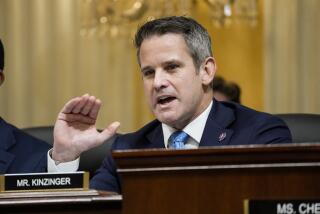Obama’s Afghanistan strategy counts on time as an ally
In his speech Tuesday at West Point, President Obama turned at least one piece of conventional military thinking on its head: The belief that announcing a timetable for withdrawing from a war simply emboldens the enemy to wait things out.
In Afghanistan, Obama said, the logic may work the other way around: “The absence of a time frame for transition would deny us any sense of urgency in working with the Afghan government. It must be clear that Afghans will have to take responsibility for their security and that America has no interest in fighting an endless war in Afghanistan.”
So although he announced that he will send 30,000 more U.S. troops to Afghanistan, a number close to what his commanders requested, he was quick to add that “after 18 months, our troops will begin to come home.”
The Taliban may be the deadliest threat the U.S. faces in Afghanistan, but it is by no means the only enemy. Almost as dangerous is the corruption and incompetence of Hamid Karzai’s government, which has alienated Afghans and allowed the Taliban to stage a resurgence. A third threat is the waning support of the American people. In the face of all those opponents, time is not on the American side.
The president’s speech aimed to address all three of those problems at once -- and make time an ally instead of an enemy. Obama’s hope is that setting a timetable for withdrawal is the best way to compel his balky partner Karzai to clean up his government and train bigger and better Afghan forces to take over most of the battle.
In some ways, Obama’s new tack borrows directly from the “surge” that his predecessor, George W. Bush, launched in Iraq in 2007: a quick increase in U.S. troop strength, more training for local forces and an offer of reconciliation for insurgents who want to change sides. Obama opposed Bush’s “surge” at the time, but on Tuesday he used the word without apology, calling his strategy “an extended surge.”
But where Bush’s escalation came wrapped in promises that U.S. forces would remain in Iraq until victory was achieved, no matter what the cost, Obama’s troop buildup is all about exit strategies -- and, more fundamentally, about the limits of U.S. power in a time of economic crisis.
“As president, I refuse to set goals that go beyond our responsibility, our means or our interests,” he said at West Point. “We simply cannot afford to ignore the price of these wars.”
Obama, unlike Bush, is preoccupied by the limits of U.S. power. He believes the United States has neither the money, time nor will to fight a big counterinsurgency war in Afghanistan. His hope is to turn those limits into leverage and use them to convince the Afghans that this is their last chance to succeed.
If it works, he will have scored a brilliant success. If not, he will -- in his argument -- be no worse off than before, facing the same unpalatable options two years further down the road.
Obama never wanted to be a war president. His speech at West Point was more dutiful than eloquent, with little of the passion that fueled his presidential campaign, or even his Sept. 9 address to Congress calling for a healthcare reform bill.
Over lunch in the White House library a few hours before the speech, Obama spoke passionately to a small group of journalists about his fears that the cost of the war could obstruct his ambitious domestic agenda the way the Vietnam War wrecked Lyndon Johnson’s programs.
“I am painfully clear that this is politically unpopular, precisely because the American people are rightly focused on how do we rebuild America,” he said. “I would prefer not having to deal with two wars right now, because we’ve got a lot of other business we’ve got to do.
“I’m interested in nation-building here in the United States right now,” he said. “We cannot afford another trillion dollars” in war spending.
And he sounded understandably frustrated by his choices in Afghanistan.
“None of this is easy,” he said. “We are choosing from a menu of options that are less than ideal.”
Asked whether he was satisfied with his decision, he gave this less-than-hearty endorsement: “Given the circumstances, this is the best option available.”
McManus, a former Times Washington Bureau chief, is an Opinion columnist.
More to Read
Get the L.A. Times Politics newsletter
Deeply reported insights into legislation, politics and policy from Sacramento, Washington and beyond. In your inbox three times per week.
You may occasionally receive promotional content from the Los Angeles Times.











